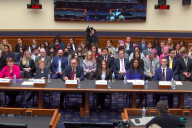You have /5 articles left.
Sign up for a free account or log in.
Students, employees and alumni have been protesting SPU’s hiring policies since May.
Chloe Guillot
Facing a state investigation for discriminatory hiring practices against LGBTQ+ individuals, Seattle Pacific University is going on the offensive, suing Washington attorney general Robert Ferguson.
The lawsuit, filed Wednesday, accuses Ferguson of violating the Free Methodist Church–affiliated university’s constitutional right “to decide matters of faith and doctrine, to hire employees who share its religious beliefs, and to select and retain ministers free from government interference.”
At the root of the lawsuit is a policy that has long been a source of friction at Seattle Pacific: a prohibition on the hiring of openly gay faculty and staff members, which the president and Board of Trustees have vigorously defended despite opposition from students, employees and alumni. Students have walked out and sat in to protest the policy; the board refuses to budge out of concerns that doing so would end its 130-year membership in the Free Methodist Church.
The Lawsuit
Seattle Pacific filed suit amid an investigation by Ferguson that has asked the university to produce details on its policies regarding the hiring, promotion, discipline and termination of SPU employees related to their sexual orientation; to identify and describe such instances; to provide complaints from current, former or prospective employees related to issues around their sexual orientation; and to share job descriptions and hiring criteria. The investigation, according to a letter to SPU, is looking at “whether the University is meeting its obligations under state law.”
SPU subscribes to the belief that “sexual experience is intended between a man and a woman,” according to its Statement on Human Sexuality. Its policy holds that “employees are expected to refrain from sexual behavior that is inconsistent with the University’s understanding of Biblical standards, including cohabitation, extramarital sexual activity, and same-sex sexual activity.”
In the lawsuit, lawyers for the Christian university accused Washington’s attorney general of “wielding state power to interfere with the religious beliefs of a religious university, and a church, whose beliefs he disagrees with. He is using the powers of his office (and even powers not granted to his office) to pressure and retaliate against Seattle Pacific University.”
Letters to the Editor
Readers have submitted
responses to this article.
You can view the letters
here and here. Find all
our Letters to the Editor
here.
Interim president Pete Menjares—who has been the subject of protests, including from students who handed him rainbow flags at graduation instead of shaking his hand—defended Seattle Pacific in a statement announcing the lawsuit: “For over 130 years, our university has been guided by our Christian mission and purpose, and we’re asking to continue that tradition. The faith commitment of our faculty and staff is an essential foundation to our identity as a Christian university.”
Lori Windham, senior counsel at Becket Law, which is representing SPU in its suit against Ferguson, said in a statement that “the state is going after a 130-year-old Christian university and violating our country’s long-standing principle of the separation of church and state.”
Becket Law, a Washington, D.C.–based firm focused on religious liberty, is representing SPU free of charge, Windham told Inside Higher Ed by email.
Ferguson fired back with a statement of his own Friday morning.
“Seattle Pacific University admits that it refuses to hire gay faculty and staff. In May, Seattle Pacific University students and staff staged a sit-in and called for the removal of the University’s board of trustees after they voted to keep in place school policies that prohibit employees from engaging in ‘same-sex sexual activity.’ Numerous Seattle Pacific University students, faculty, and others reached out to my office to file complaints or otherwise express deep concern that the University administration’s policies illegally violate Washingtonians’ civil rights,” Ferguson said.
Ferguson’s statement adds that it is the job of the attorney general’s office to protect “the civil rights of Washingtonians who have historically faced harmful discrimination. That’s our job—we uphold Washington’s law prohibiting discrimination, including on the basis of sexual orientation.”
The Backlash
Seattle Pacific University’s ban on gay employees has been a matter of sharp contention in recent months, leading to the resignation of board members, drawing condemnation from the university community and prompting threats of a lawsuit against the Board of Trustees. So far, community members have raised more than $38,000 to fund a lawsuit against the board.
The policy itself was considered at length following a lawsuit brought by Jeaux Rinedahl, a gay adjunct nursing professor who sued SPU claiming he was denied a full-time position due to his sexual orientation. That lawsuit was settled out of court, according to SPU’s website, but prompted the creation of a work group that delivered policy recommendations to the board around the hiring of LGBTQ+ individuals. The work group made suggestions that would have allowed Seattle Pacific to change its policies in a way that kept it in standing with the Free Methodist Church, but that process was allegedly corrupted by trustees leaking documents to the denomination, which caused the church to tighten its policies on same-sex marriage. That meant SPU would be cast out of the Free Methodist Church if it changed its policies to accept LGBTQ+ employees, as the work group recommended.
The board has twice voted to uphold SPU’s homophobic hiring policies, first in April 2021 following Rinedahl’s lawsuit and again in May 2022 after the work group delivered its recommendations. The backlash since May has garnered national and international headlines.
In a Thursday morning email, Menjares told campus constituents that the lawsuit was based on SPU’s “foundational history and principles.” He added, “While I am deeply aware our community is divided on our expression of Christian life as it relates to LGBTQIA+ and faithful Christian living, I believe we can be united in our desire to protect and defend the University’s right within the law to hire to mission within a voluntary community based on a shared framework of faith. We do not want to lose that freedom. In the same way, we hope to protect our ability to practice a faith that welcomes students from all backgrounds—including historically underrepresented and marginalized groups—to cultivate deep, thriving relationships with Christ.”
The lawsuit, and Menjares’s email, has further energized opponents of SPU’s hiring policies.
Kevin Neuhouser, a sociology professor and co-chair of the work group that recommended the board change its policies, sent an email to Menjares and faculty members arguing that no one asked “SPU to give up its right to exclusively hire Christians.” The change, he said, was to allow for the hiring of Christians who aren’t heterosexual or heteronormative.
“It is shameful and hypocritical for SPU to sue an Attorney General who is investigating whether or not SPU discriminates. When—and how—did ‘Christian’ in the United States become a synonym for discrimination and prejudice? Why are we fighting a legal battle for the ‘right to discriminate’—in fact, the right to discriminate against fellow followers of Jesus?” he wrote.
Neuhouser further accused the administration and the board of putting SPU’s “financial viability at risk by alienating current students, potential students, faculty and staff, the Seattle community” and by spending money on an “immoral lawsuit” even as budget cuts and layoffs loom at the institution.
Neuhouser concluded his email sharply: “I have lost hope in the Board of Trustees to defend our Christian identity; I have lost faith in the SPU administration to defend our Christian identity. My only hope is that Attorney General Bob Ferguson will use the law to get SPU to do what we should voluntarily do in order to be faithful to the God who is gracious, generous, and forgiving to us far beyond anything we deserve … if only we could be imitators of the God we claim to love.”
Similarly, the students and recent graduates who led the sit-in campaign against the SPU administration took exception to the lawsuit, stating in a press release that they approved of the state’s investigation into university hiring practices and condemning the complaint brought by SPU.
“The school must be held accountable for its stance to maintain harmful employment policies that do not reflect the values of the students, faculty, staff, and alumni of SPU,” read a statement the organizers sent to Inside Higher Ed. “The greater Seattle Pacific community is disappointed that the school decided to file a lawsuit that does not represent the interests or beliefs of the majority of the university. The fight for inclusive hiring policies is not an issue of religious freedom, but rather an outcry against the unchecked power of administrators to dictate ‘right’ Christian practices at an ecumenical institution of higher education. Seattle Pacific University advertises itself as an ecumenical institution dedicated to the inclusion of all different walks of Christian faith. By invalidating all Christian traditions who affirm the LGBTQ+ community, Seattle Pacific [is] out of accordance with its own stated values and continues to perpetuate harm.”
Ferguson’s office had not filed a legal response to the lawsuit as of publication.






_edit.jpg?itok=d3X97aqv)

